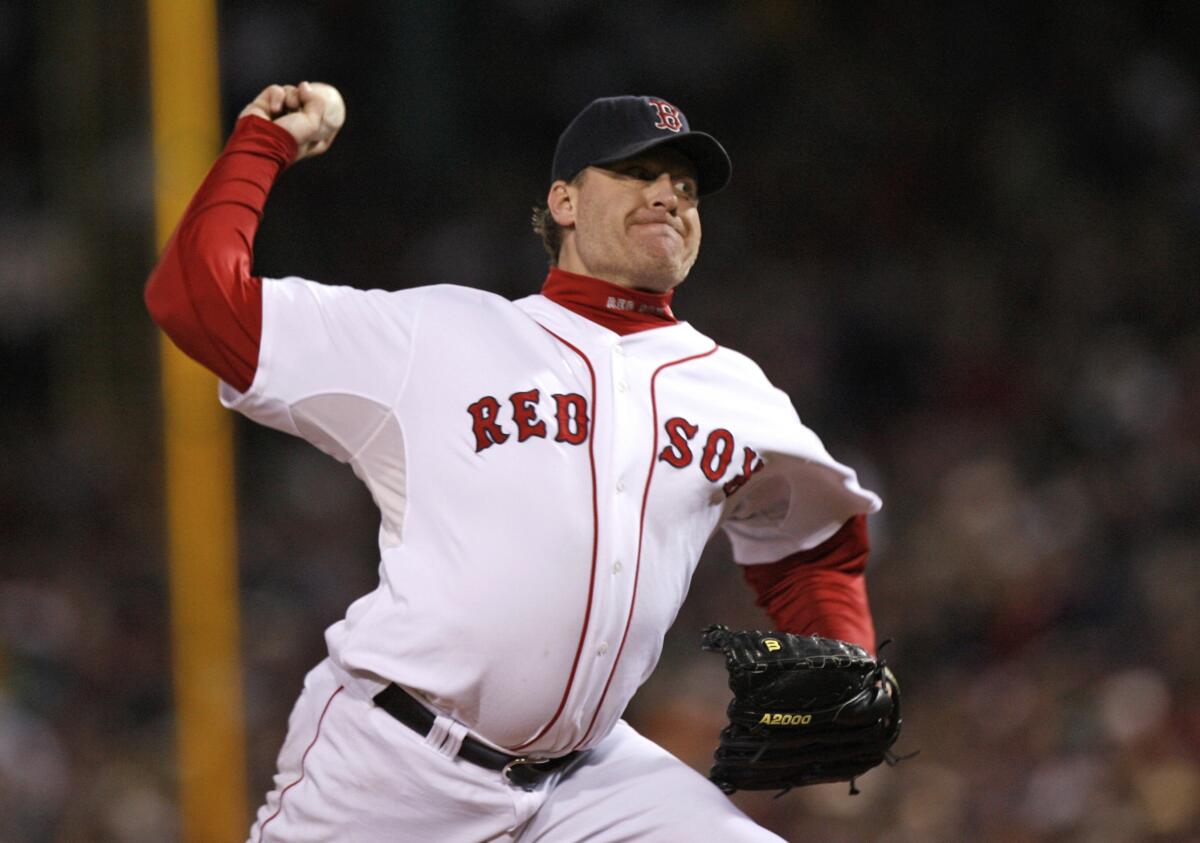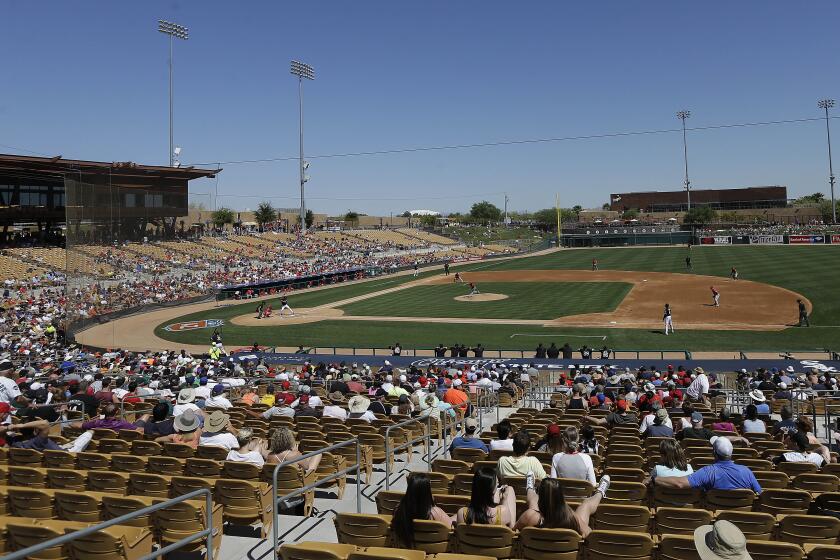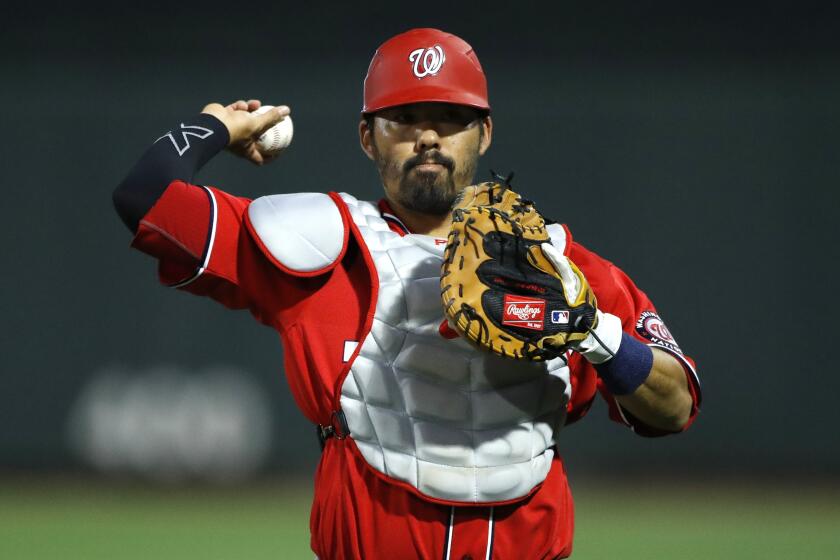Baseball writers spurn controversial candidates, elect no one to the Hall of Fame

The commissioner of baseball, Rob Manfred, spoke Tuesday at a memorial service for Hank Aaron.
“It was an honor to know one of the best — if not the best — player of all time,” Manfred said. “It was a pleasure to spend time with a man of humility and dignity who helped change America.”
Those descriptions seldom are applied to Barry Bonds, who broke Aaron’s all-time home run record. Aaron won election to the Hall of Fame on his first try, with 98% of the vote.
A few hours after Manfred spoke, Bonds was rejected for the Hall of Fame for the ninth time.
So was Roger Clemens, who won the Cy Young Award a record seven times.
So was Curt Schilling. For all three, a 10th and final chance at election awaits next year.
Schilling came the closest this year, getting 71% of the vote when 75% was required.
Bonds and Clemens each got 62%, up from 61% last year. Unless dozens of writers decide the Hall would be incomplete without Bonds and Clemens, and vote for them on the last try, neither would win election next year.
Schilling promptly announced he was done with the process.
“I will not participate in the final year of voting,” he wrote on Facebook. “I am requesting to be removed from the ballot.”
The Hall of Fame did not accede to Marvin Miller’s request to be removed from consideration. The first executive director of the players’ assn. will be inducted posthumously this summer. The Hall is unlikely to drop Schilling from the ballot.
Schilling ripped the baseball writers who vote as men and women “who lined up to destroy my character” and said he would be happy to be considered by a veterans’ committee. He also ripped Bonds and Clemens, who would have been first-ballot Hall of Famers if statistics and awards were the only criteria.
“I’m now somehow in a conversation with two men who cheated, and instead of being accountable they chose to destroy others lives to protect their lie,” Schilling wrote. “I will always have one thing they will forever chase. A legacy.”
This could be easily dismissed as a rant by a disgruntled man, except that Schilling’s position on Bonds and Clemens is the same as the official Hall of Fame position.
Not technically, of course. Hall officials say writers are free to vote their conscience, to interpret the murky voting guidelines however they like.
But no Bonds and no Clemens is exactly how the Hall of Fame prefers it.
Ten Hall of Famers have passed within the past 10 months. Aaron was one of them. So was Joe Morgan.
In 2017, as vice chairman of the Hall of Fame, Morgan wrote a letter to BBWAA voters. He did not drop the name of Bonds or Clemens — or anyone else, for that matter — but he made clear neither would be welcome in Cooperstown.
“Steroid users don’t belong here,” Morgan wrote.
Arizona officials asked MLB to postpone spring training because of virus surge. Players worry that doing so might trim the season and salaries.
Neither Bonds nor Clemens failed an MLB drug test. The federal government charged Clemens with perjury for lying when he said he did not use steroids, but Clemens prevailed. The feds also charged Bonds with perjury in testimony about steroids, but he also prevailed.
Both Bonds and Clemens were cited in the 2007 Mitchell Report, the league-commissioned investigation into steroid use in which most players declined to cooperate. In his letter, Morgan said such a citation was enough to keep a player out of the Hall.
The Hall asks voters to consider “the player’s record, playing ability, integrity, sportsmanship, character, and contributions to the team(s) on which the player played” but offers no guidance as to how to apply the criteria.
Or, at least, it did not offer guidance until Morgan’s letter.
“I care about how good a player was or what kind of numbers he put up,” Morgan wrote, “but if a player did steroids, his integrity is suspect; he lacks sportsmanship; his character is flawed; and, whatever contribution he made to his team is now dwarfed by his selfishness.”
The most celebrated newcomers to the ballot next year: Alex Rodriguez, who was suspended an entire season for steroid use; and David Ortiz, whom the New York Times reported had failed a drug test in a year when there were no penalties or public admonishments for doing so. (Ortiz has denied the report.)
If Bonds and Rodriguez are not elected, the Hall of Fame would not include two of the top four players on the all-time home run list — and six of the top 15. Mark McGwire was contrite. Sammy Sosa was not. It made no difference to the voters.
Little wonder, then, that the commissioner who presided over the steroid era appeared more concerned with escaping responsibility for record-breaking accomplishments than celebrating them. On the night Bonds tied Aaron’s all-time record of 755 home runs, Bud Selig issued a clumsy statement that started with the word “congratulations” and included the words “controversy” and “innocent until proven guilty.”
On the night Bonds broke the record, a message from Aaron appeared on the video screen in San Francisco.
Kurt Suzuki might not have been best all-around catcher available in free agency, but he does offer something valuable for the Angels’ pitching staff.
“I would like to offer my congratulations to Barry Bonds on becoming baseball’s career home run leader,” Aaron said. “It is a great accomplishment which requires longevity and determination. Throughout the past century, the home run has held a special place in baseball, and I have been privileged to hold this record for 33 of those years.
“I move over now and offer my best wishes to Barry and his family on this historical achievement. My hope today, as it was on that April evening in 1974, is that the achievement of this record will inspire others to chase their own dreams.”
Aaron will be buried Wednesday. He leaves us a legacy of power and grace, one which might serve us all well in the future, whether or not we have a Hall of Fame vote.
2021 Hall of Fame voting top 10
Curt Schilling 71.1%
Barry Bonds 61.8%
Roger Clemens 61.6%
Scott Rolen 52.9%
Omar Vizquel 49.1%
Billy Wagner 46.4%
Todd Helton 44.9%
Gary Sheffield 40.6%
Andruw Jones 33.9%
Jeff Kent 32.4%
Players who will appear on the ballot for the first time next year
Carl Crawford
Prince Fielder
Ryan Howard
Tim Lincecum
Joe Nathan
David Ortiz
Jonathan Papelbon
Jake Peavy
A.J. Pierzynski
Alex Rodriguez
Jimmy Rollins
Mark Teixeira
Years no one was voted by the BBWAA to the Hall of Fame since 1960
2021 (Top vote-getter: Curt Schilling, 71.1%)
2013 (Craig Biggio, 68.2%)
1996 (Phil Niekro, 68.3%)
1971 (Yogi Berra, 67.2%)
1967 (Red Ruffing, 72.6%)
1964 (Luke Appling, 70.6%)
1960 (Edd Roush, 54.3%)
Editor’s note: The Times does not permit its writers to participate in voting for the Hall of Fame.
More to Read
Go beyond the scoreboard
Get the latest on L.A.'s teams in the daily Sports Report newsletter.
You may occasionally receive promotional content from the Los Angeles Times.













